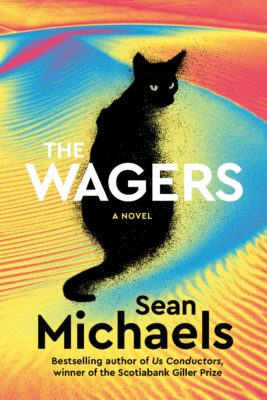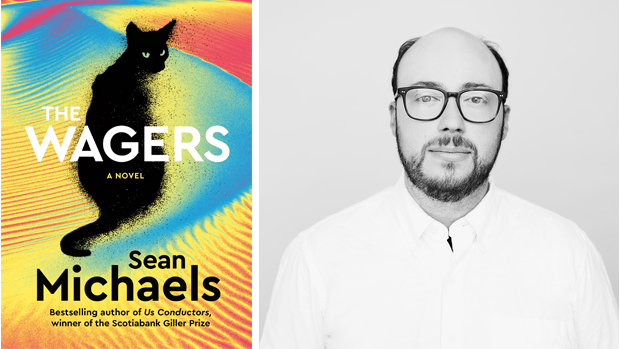Sean Michaels’s second novel is about luck. The Wagers also casts a tender, incandescent light on ramshackle grocery stores, extended families, stand-up comedy, sibling rivalry, romantic and platonic love, art-making, and an unnamed city that looks uncannily like Montreal.
At the novel’s heart is Theo Potiris: sympathetic everyman, grocery scion, and middling stand-up comedian. When we meet him, thirty-six-year-old Theo is stumbling through life, running the family store, and occasionally performing at comedy nights. He writes letters to his girlfriend, who has disappeared into the desert for a “clarity retreat” operated by a mysterious billionaire. The balance is upset when tragedy strikes Theo’s family, and then a stroke of exorbitant luck visits his niece, leaving him wondering why the unearned good fortune we all covet never seems to come his way.
These changes usher in the book’s second act, which sees Theo join first The Rabbit’s Foot, an international tech concern harvesting big data to beat bookmakers at their own game, and then the No Name Gang, a sexy crew carrying out daring heists from Dublin to Taipei to Marrakech.
“I wanted a gang of thieves,” Michaels tells me, on a bench in Outremont Park after a tour of his favourite grocery store. “But I felt it was missing a little magic – literally and figuratively.” His solution? The score his gang pursues is not art or gems, but luck itself, which in The Wagers is a physical substance like sand known only to a small elite of luck “hoarders” and the thieves working to dispossess them.
Though the world in The Wagers is shot through with magic, Michaels’s alertness to the wonderful texture of the real world is more impressive still. Asked about his penchant for noticing countless small details and sliding them into his work, he grows animated and describes a sparrow that regularly visits his favourite café. “You don’t want to get to the point where you’re inured, blind to the fact that there’s a sparrow hopping around the floor […] There’s magic everywhere, story everywhere.”

The Wagers
Sean Michaels
Random House Canada
$32.95
cloth
384pp
9780735278110
This same dedication to research and craft led Michaels to perform stand-up comedy for the first time, an experience he calls “agonizing.” But this wager paid dividends: a scene in the novel where Theo goes onstage and bombs is an unforgettable instance of one of the book’s key motifs.
“A flop is much more authentic to what the experience of making art is,” Michaels explains. “You transmute experience into something, and it works out – okay. Being an artist is mostly about just doing the thing you do, year after year.”
And Sean Michaels has been doing what he does for many years now. His accomplished, Giller Prize–winning debut Us Conductors did not spring up out of nowhere, but grew from a practice honed over years of writing about music – often three times a week – on the seminal mp3 blog he founded, Said the Gramophone. He likens his music writing to the “gym” where he developed the skills and work ethic to produce, good days and bad. Publishing with relentless frequency spurred experimentation.
Whether he’s finding the words to describe an ineffable song or amassing the details to evoke a twenty-first-century city, Michaels is simply one of our great noticers. He cultivates an ardent but never wanton love of simile and metaphor; in The Wagers he gives us a baby “swaddled like a pita souvlaki,” and “ageless soft rock” wafting through a room “like muslin,” and a woman’s laugh coming up from deep, “like ore from a mine,” and a night “stilled and pearly.”
I ask whether Michaels felt freer to experiment on a second novel. “In a way, but at the same time I’m filled with anxiety,” he admits. “It’s sort of like jumping off a cliff. You think: ‘this’ll be fun. Let’s do it.’ And hopefully you survive.” This freedom doesn’t mean that the effect is left to chance, however. “I want things to feel shaggy at certain times, and really sleek at others.”
The Wagers is also formally diverse: There is an academic article, a novel within the novel, even a hard-boiled detective episode. As the gang of thieves takes centre stage, the vibe shifts from Wes Anderson to Steven Soderbergh, and we anxiously turn pages to see how and whether they can pull off their heists. In the third act, when Theo’s old and new lives collide in a Moroccan desert retreat run by the owner of the ominous Z Largo conglomerate, the many loose ends that have been dropped along the way are all somehow gathered and tied up.
As I ask Michaels how he does it, our park bench is swarmed by ten, twenty, thirty, maybe forty preschool-aged children, whooping and screaming and singing a song in surprising unity. There is not an adult in sight. Our conversation is drowned out, yet it’s hard to imagine a clearer demonstration of Michaels’s theory – that art serves to transmute, through patient work, the magic abundantly present everywhere in this and every other city.
As a comedy critic in The Wagers puts it, “Good comedy is just seeing.”
Born in Scotland, Michaels grew up in Ottawa, and moved to Montreal for university, an experience he describes with the French term coup de foudre. Though its setting goes unnamed, The Wagers feels like a love letter to the author’s adopted city, as he name-checks and describes countless bookstores and eating spots and books and zines and bands and friends.
“I wanted to conjure up what makes Montreal special,” he explains “but in a way that could apply to any city.” Thus the thieves’ headquarters is a hardware store/casse-croûte – not a real business, but representative of the “shabby, magical” institutions that have long thrived in Montreal.
We discuss how such businesses are threatened by the forces of finance and tech as they swallow up the old to make way for the new. Michaels considers this tension an undercurrent of his novel, and while he sees both sides, he remains adamant about the value of preservation: “The value of these old things isn’t only nostalgia, but in how it introduces a sense of texture and colour and story and eccentricity and magic into our lives. It’s valuable, and it’s worth preserving.”
The Wagers is a work of great poise and maturity. But it’s also just plain fun, gloriously unafraid to play and laugh and throw jokes out into the room to see whether they land. Sean Michaels today seems every bit as excited as his younger self discovering a new favourite song. It’s reassuring to those of us prone to wondering whether anything worthwhile can survive – from ramshackle grocery stores to affordable cities to these bundles of stitched signatures bound into 384-page books travelling through drafts and revisions and editors and publishers and delivery trucks and booksellers to finally land in the hands of a grateful reader.
Can any of this last? It’s a question Theo asks of his aging family grocery store. “It could not go on this way,” he concludes. “Or perhaps, because it always had, it could.” mRb







0 Comments